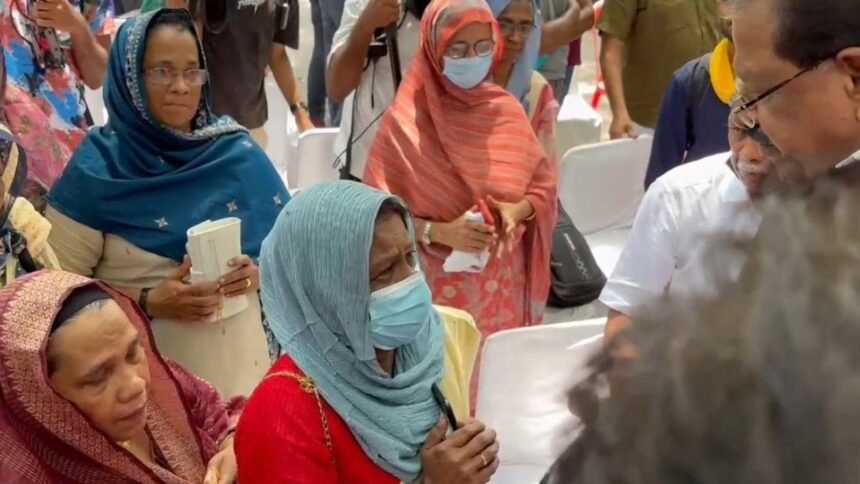“I shifted my daughter from a private school to a government school since I cannot afford it anymore,” Kuldeep said, sobbing over a phone call, while boarding a bus from Delhi to Sangrur in Punjab.
She was among the 50 families from Uttar Pradesh, Punjab, Kerala, and Karnataka who protested at Jantar Mantar Thursday, led by the Indian Pravasi Movement. They urged the government to immediately implement the 2015 India-Qatar agreement on the transfer of sentenced people to repatriate Indian prisoners and an audit of the Indian Community Benevolent Fund (ICBF).
Approved by Prime Minister Narendra Modi in December 2014, the agreement allows “Indian prisoners imprisoned in Qatar or vice-versa to be near their families, for serving the remaining part of their sentence and shall facilitate their social rehabilitation”.
Similar agreements have been signed with countries such as the United Kingdom, Mauritius, Bulgaria, Brazil, Cambodia, Egypt, France, Bangladesh, South Korea, Saudi Arabia, Iran, Kuwait, and Sri Lanka.
The ICBF, under the auspices of the Embassy of India in Doha, Qatar, has been established to provide financial, medical, and other forms of assistance to distressed and underprivileged Indians.
However, Kuldeep’s husband, Sandeep Singh, 40, arrested on charges of possession of drugs in his car, has been in jail for two and a half years, serving 10 years of imprisonment. His wife and a fourteen-year-old daughter live alone.
“He shifted to Doha in 2007 and has been a taxi driver since then. Recently, he bought his private car. One day, a customer left a bag, which had drugs. Later, the police arrested my husband. Now he is lodged in the central jail, and earns money by washing the clothes of the officers, and then calls us with that money.”
Story continues below this ad
Kuldeep is angry with the government’s lack of support. “I have given multiple written complaints now, even to the PM office, the Indian and Qatar embassies. My husband calls me every Friday. On the last call, he said that to date, the lawyer assigned to him by the Qatar government has never come to meet him or present his case. The judge just gave the verdict.”
However, she had learned about the protest through her husband a week earlier. “I have come to Delhi multiple times to file complaints, have exhausted all my resources, and I don’t have a job either. He told me over the phone that a group from Kerala is protesting in Delhi, as he had learned from other inmates. I have not given up hope, wherever they say, I will go,” she said.
For Parveen Kaur, from Amritsar, her biggest challenge is to make her children understand their father’s whereabouts. “They cry when he calls, asking when you will come. My seven-year-old daughter has lost interest in studies,” she said while travelling along with Kuldeep.
Her husband, Gurjeet Singh, also a taxi driver in Qatar, was arrested in a drug case on October 12, 2022.
Story continues below this ad
“I had called him in the daytime, and he said he would call me back. But when he never did, I rang him multiple times at night, then he said he was in the police station,” she said.
Now, raising her two children alone, she said that her parents are assisting her, but they are also taking a step back due to the expenses. “I had sold my jewellery and collected Rs 4.5 lakh and did a direct bank transfer to the Qatar lawyer. His (lawyer’s) wife, an Indian, translated to me what the lawyer was saying. They said my husband would be deported soon. But after that, they stopped picking up my calls,” she said, her voice shaking, adding that she, too, received no help from the Indian embassy and the Indian government.
Ashraf Ponnain, from Malappuram district in Kerala, was once a prisoner in Qatar, but is now back in India. However, during his last visit, he was unaware that his son, Naushad, had also been implicated in a cheque fraud case.
“I found out that my son was in jail after I got out. They accused him falsel; the sponsor had planted everything. The sponsor made him sign a blank cheque of 1 lakh 40 thousand Riyal. I have lost all the resources now,” he said, adding that he had already paid large amounts to get himself out by selling his shops back in Kerala, and now he has no money left to help his son.
Story continues below this ad
R J Sajith, president of the Indian Pravasi Movement, said the prisoners, all coming from poor households, have already borrowed money to reach the foreign country. “Why is there no implementation of the agreement? Where are the funds from the ICBF going? These people are voiceless, but the embassy and the government have offered no help till now,” he alleged.







